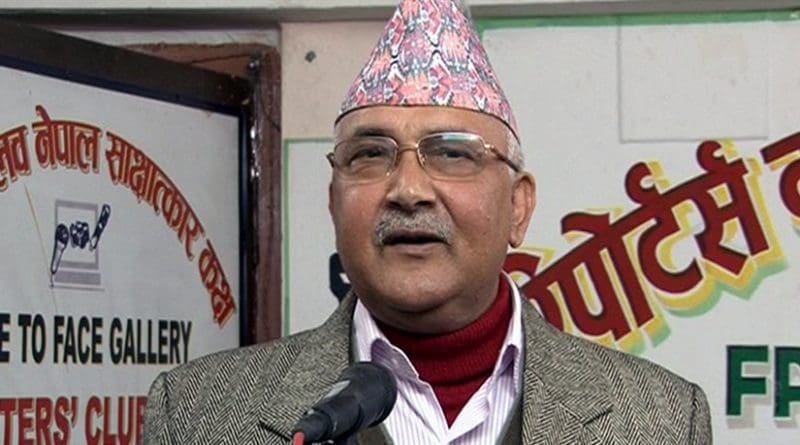Heavy-Handed Tactics With Nepal Are Best Avoided – OpEd
By Nishant Rajeev*
In the wake of KP Oli’s resignation as the Prime Minister of Nepal and allegations of the Indian administration’s hand in toppling his government, Oli cautioned India against any meddling in Nepal’s affairs. Earlier this month Oli met Indian Ambassador Ranjit Rae and made it clear that “any unnatural meddling in Nepalese affairs would be unacceptable”.These remarks by Oli make it appear as though the Indian government is solely responsible for him losing the power and that the deficiencies in the Constitution of Nepal adopted by the ruling elite were of no relevance. Oli implies that the political turmoil in his country can have no fallout in India and hence India has no right to interfere or ‘meddle’ in Nepal’s affairs. A closer look at the political situation will highlight the wide ranging implications for India.
The ongoing crisis started right when Nepal adopted its newly drafted Constitution on September 20 2015. However, even before it was instituted, there was widespread discontent amongst various sections of the population over provisions of citizenship, representation of marginalised communities and federal delineation of states. The main groups who have been protesting the contentious clauses are the Tharu and Madhesi ethnic groups of the Terrai region. The Tharus have been opposing the proposal to split their state into two as it would make them minority in both the new states and give them less representation in the legislature. The Madhesi people have been protesting the clauses of citizenship and claim that the rules disproportionately affect them as many of them have family links on Indian side of the border through marriage.
As these groups reside right on the India-Nepal border (in the Terai region), they have been able to block a number of border crossing points which are essential for a land-locked country like Nepal. This situation had led to a severe shortage of essential commodities with the fuel shortage being especially felt by large sections of the society. During this crisis, allegations of an Indian imposed blockade had emerged. It is said that India blocked a number of border crossing points on its side of the border to prevent supply of fuel (and other essential goods) and thereby apply more pressure on the Nepalese government.
These allegations have allowed the Nepalese government to dodge the bullet and divert attention from the real issue at hand. It is obvious that Nepal needs to address some important issues with regards to its constitution. The Sri Lankan civil war is one good example. Sri Lanka had adopted many policies that were clearly discriminatory towards the local Tamil population. Unable to sort out their differences through dialogue, the country got engulfed in a civil war which lasted over 26 years. As a consequence, various negative externalities have affected India as well; the steady stream of Tamil refugees escaping the island, the formation of a Liberation Tigers of Tamil Eelaam (LTTE) network in southern India and the political unrest caused in the state of Tamil Nadu. This culminated in an Indian military intervention and the assassination of Rajeev Gandhi. Another good example would be the West Pakistan military crackdown in the East to suppress Bengali calls for self determination. Operation Searchlight, as it was known, saw an influx of nearly 10 million refugees into the states of Assam and West Bengal. This again culminated in an Indian intervention.
The above mentioned examples clearly demonstrate how instability of our neighbours can affect India. For one, the surge of refugees would be impossible to control or catalogue (in case a conflict erupts) as Nepal and India share an open border. Also Nepal is a known transit route for terrorists and fake currency, the ramifications for India’s national security can be huge. However, we should have a measured and calculated response to the situation. Rushing in with heavy-handed tactics like an economic blockade is always a questionable approach. We must first try and co-opt the government of Nepal rather than coerce them into opening a dialogue with the affected parties.
India should adopt a role whereby it can mediate constructive engagements between all the stakeholders to resolve their differences. Coercive strategies tend to strain relationships between governments and lead to a loss of trust with the local population and hence its use must be considered only after all avenues of diplomacy, dialogue and peaceful negotiations have failed. This approach would give us an opportunity to take up a leadership capacity at a number of regional forums. It will greatly enhance India’s global image as an inclusive democracy.
*Nishant Rajeev is a student of The Takshashila Institution’s Graduate Certificate in Public Policy course. Comments and suggestions on this article can be sent on: [email protected]

